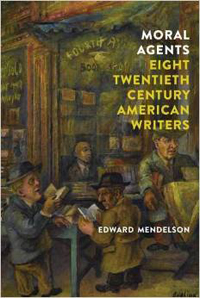 Edward Mendelson, Moral Agents; Eight Twentieth-Century American Writers (New York: NYRB, 2015), 203pp.
Edward Mendelson, Moral Agents; Eight Twentieth-Century American Writers (New York: NYRB, 2015), 203pp.
"This is a book," writes Edward Mendelson, "about writers, morality, and power." The eight writers he considers wielded unusual power and authority to shape the national narratives of America — Lionel Trilling, Dwight Macdonald, Alfred Kazin, William Maxwell, Saul Bellow, Norman Mailer, W.H. Auden, and Frank O'Hara.
Such was their public vocation. In Mendelson's telling, they also struggled on a personal level with the power they experienced, and with the many conflicts "between their inward, intimate private lives and the lives they led in public, the choices they continually made between wearing a mask and exposing their face."
Trilling was an international celebrity who, in public, was a pipe-smoking scholar who exuded "sober decorum," whereas in his private journals he wrote about his "nihilistic despair." Kazin struggled with the tension between the collective identity of his Jewish heritage and his individuality. Maxwell, the fiction editor of the New Yorker for forty years, was a man of "hopeless stoicism." Bellow was the renegade "scholar-gangster" who blew through five marriages but also had a well-worn New Testament at his bedside during his final illness. Christianity was central to Auden's life and work, but it's the least understood aspect about him.
Earlier versions of these eight chapters were published as articles in the NYRB from 2007 to 2012. And for those who are surprised, as I was, that Mendelson selected eight white males (four Jewish) to write about, he appeals to his earlier book The Things That Matter; What Seven Classic Novels Have to Say About the Stages of Life (2006) that considered only women authors.


